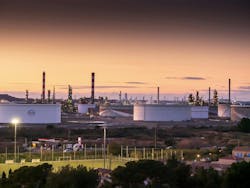ExxonMobil affiliate inks deal to shed Fos-sur-Mer refinery, logistics assets
Esso Societe Anonyme Francaise (SAF)—a majority owned subsidiary of ExxonMobil Corp. (82.89%)—has entered a formal deal for the sale of its 140,000-b/sd (133,000-b/d) Fos-sur-Mer integrated refinery in the Bouches-du-Rhône region of southern France’s Provence-Alpes-Côte d'Azur.
Under the agreement signed on July 31, Esso SAF will sell its refining and logistics operations in southern France, including the Fos-sur-Mer refinery and Toulouse (Fondeyre) and Villette de Vienne terminals, to Rhône Energies, a consortium of Entara LLC and Trafigura Pte Ltd., the parties said in separate Aug. 1 releases.
Official signing of the deal follows completion of previously announced formal information and consultation with Esso SAF employee representative bodies required as part of the sales process, the companies said.
While discussions with relevant authorities remain ongoing, Esso SAF said it anticipates finalizing the divestment by yearend 2024, pending necessary regulatory approvals.
Entara and Trafigura separately said they expect to receive all necessary authorizations for completing the transaction by end-October 2024.
Upon announcing the proposed transaction in April, Esso SAF confirmed its sale of the southern French refining and logistics assets would include transfer of 310 employees of Esso Raffinage and Esso SAF working at the sites to Rhône Energies in accordance with regulations currently in force (OGJ Online, Apr. 11, 2024).
The proposed divestments come as part of Esso's long-term strategy in France aimed at maintaining the competitiveness of its operations. Post-sale, Esso SAF previously said it would continue to guarantee continuity of supply fuels and specialty products such as lubricants, base oils, and bitumen to its customers in the south of France from the operator’s 244,000-b/sd (231,800 b/cd) Notre-Dame-de-Gravenchon refinery in Port-Jérôme-sur-Seine, Normandy, in northern France.
Future refinery plans
Following the acquisition, Rhône Energies said it aims to capitalize on the Fos-sur-Mer refinery’s existing skilled teams and strong manufacturing performance to further improve the site’s margin capture, crude-processing flexibility, and process utilization to maximize output of high-value products.
Alongside proposed investments in personnel and process safety, Rhône Energies has also committed to investing in sustainability measures at the refinery to reduce its carbon intensity footprint, as well as in growth projects to enable further co-processing of biogenic feedstocks for production of renewable fuels.
Under terms of the proposed acquisition—financial details of which remain confidential—Trafigura has agreed to enter into a minimum 10-year exclusive crude oil supply and product offtake agreement, including ownership of crude oil and product stocks in tank, to ensure the refinery has a secure supply of on-demand feedstock at competitive costs, as well as a reliable off-taker of refined products destined to the domestic market.
ExxonMobil’s Gravenchon chemical operations
In its second-quarter 2024 earnings update on Aug. 1, Esso SAF confirmed the requisite information and consultation process, as well as an internal restructuring plan, remain under way for the proposed permanent shutdown of ExxonMobil’s 100%-owned ExxonMobil Chemical France (EMCF) primary chemical production unit at its Gravenchon site co-located near Esso SAF’s Gravenchon refinery in Port-Jérôme-sur-Seine.
First announced in April in parallel with Esso SAF’s proposed divestment of the Fos-sur-Mer refining and logistics assets, planned shutdown of EMCF’s Gravenchon steam cracker will not impact refining activities at Esso SAF’s Gravenchon site, Esso SAF reconfirmed in a July 11 letter to shareholders.
EMCF’s planned shutdown of the Gravenchon steam cracker—which produces 400,000 tonnes/year (tpy) of ethylene—will include closure of related derivatives units and logistics installations as part of ExxonMobil’s plan to maintain competitiveness of its European operations, ExxonMobil said in April.
In addition to committing to providing enhanced support measures to help secure employment for 677 employees that will lose their jobs as a result of the Gravenchon chemical complex’s closure, ExxonMobil previously confirmed ongoing work to determine ways it can assist in creating new uses for the lands made available following remediation of the manufacturing site.
Alongside ethylene, EMCF’s Gravenchon complex also produces 400,000 tpy of polyethylene and 300,000 tpy of polypropylene, ExxonMobil said in its 2023 annual report.
About the Author
Robert Brelsford
Downstream Editor
Robert Brelsford joined Oil & Gas Journal in October 2013 as downstream technology editor after 8 years as a crude oil price and news reporter on spot crude transactions at the US Gulf Coast, West Coast, Canadian, and Latin American markets. He holds a BA (2000) in English from Rice University and an MS (2003) in education and social policy from Northwestern University.

